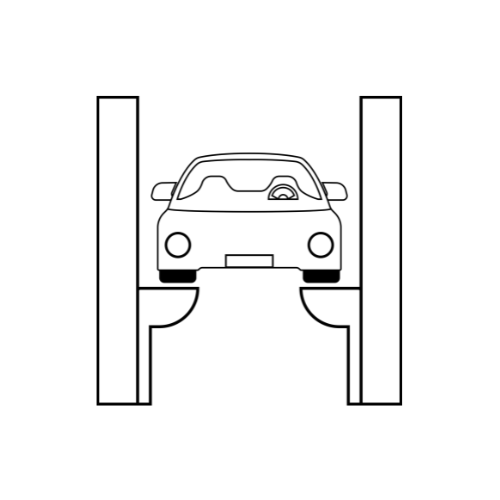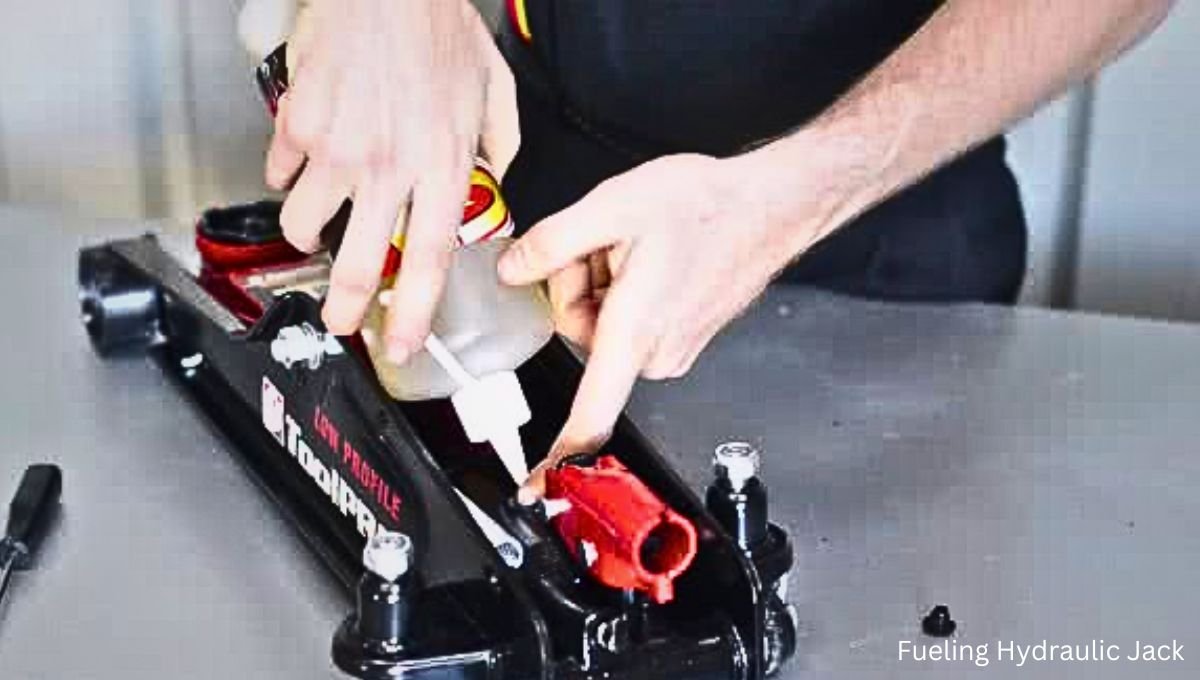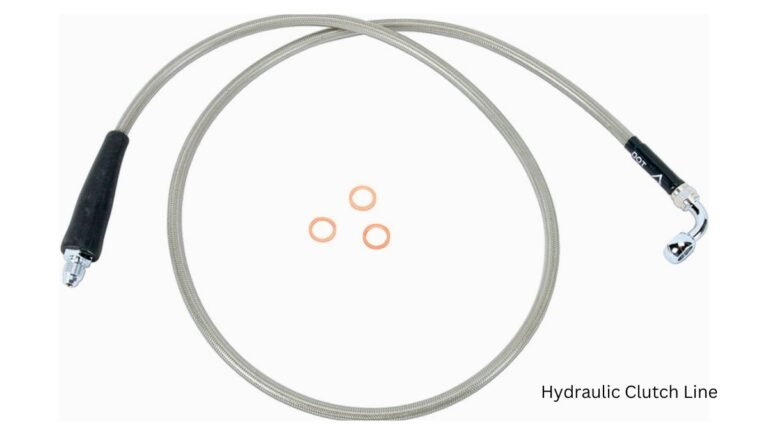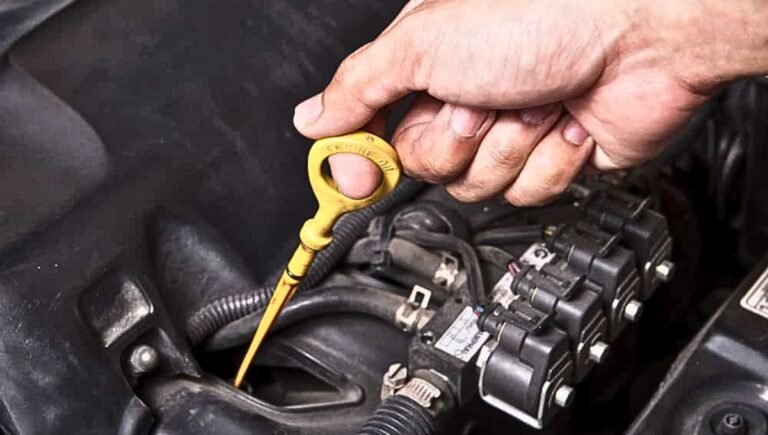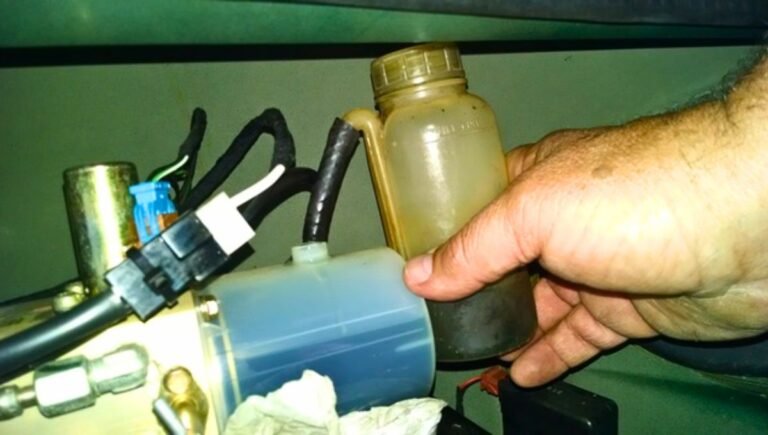Can You Use Brake Fluid in a Hydraulic Jack? Safe or Risky?
No, you should not use brake fluid in a hydraulic jack. Brake fluid and hydraulic jack oil have different properties.
Hydraulic jacks require specific hydraulic oil for optimal performance. Using brake fluid can damage the seals and internal components. Hydraulic oil provides the necessary lubrication and viscosity for smooth operation. Brake fluid, designed for brake systems, has different chemical properties that can degrade the hydraulic jack’s parts.
This can lead to malfunctions and safety hazards. Always refer to the manufacturer’s guidelines for the appropriate type of oil. Using the correct oil ensures the longevity and efficiency of your hydraulic jack. Proper maintenance keeps your equipment safe and functional. Avoid costly repairs by using the right hydraulic oil.
The Role Of Fluids In Hydraulic Jacks
Hydraulic jacks rely heavily on fluids to function effectively. The fluid inside a hydraulic jack helps lift heavy loads with minimal effort. Using the right fluid is crucial for the performance and longevity of the jack.
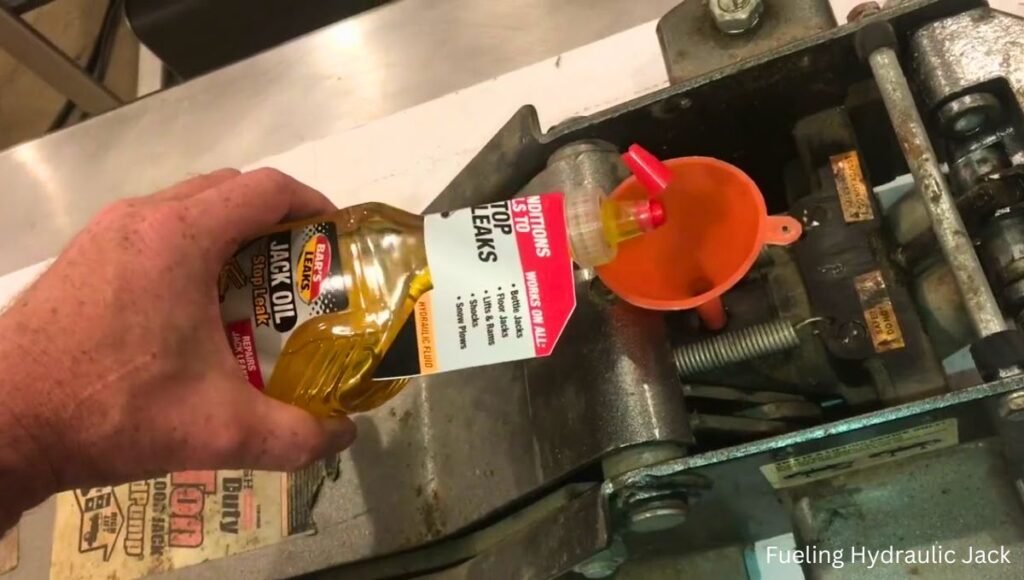
Function Of Hydraulic Fluid
Hydraulic fluid acts as a medium to transfer force. It enables the jack to lift heavy objects. This fluid is pumped into the cylinder. As it enters, it pushes the piston upward. This action creates the lifting force.
The fluid must be incompressible. This ensures it can transfer force efficiently. Compressible fluids would not work well. They would cause a loss of force and efficiency.
Properties Of Ideal Hydraulic Fluids
Ideal hydraulic fluids must have specific properties. These include:
- Viscosity: The fluid should have the right thickness. It should not be too thick or too thin.
- Lubrication: Good hydraulic fluids provide excellent lubrication. This reduces wear and tear on parts.
- Non-corrosive: The fluid should not corrode the internal parts of the jack.
- Thermal Stability: It should remain stable under various temperatures.
- Cleanliness: The fluid should be free of contaminants.
Using the wrong fluid, like brake fluid, can harm the jack. Brake fluid has different properties. It is designed for braking systems, not hydraulic jacks. Always use the recommended hydraulic fluid for your jack.
Brake Fluid Basics
Understanding brake fluid is important. It is a key part of vehicle safety. Let’s explore the basics of brake fluid.
Composition Of Brake Fluid
Brake fluid is a specialized fluid. It is designed to work under high heat and pressure. Most brake fluids are made from the following components:
- Glycol Ethers: These are the main ingredient in many brake fluids.
- Polyglycols: These help the fluid perform well under heat.
- Inhibitors: These prevent corrosion and oxidation.
- Silicones: Found in some brake fluids for special applications.
Each component has a specific role. Together, they ensure the brake fluid works efficiently.
Characteristics Unique To Brake Fluid
Brake fluid has some unique characteristics. These make it suitable for use in braking systems.
- High Boiling Point: Brake fluid must withstand high temperatures.
- Non-Compressible: It must not compress under pressure.
- Corrosion Resistant: It protects metal parts from rust.
- Lubrication: It helps keep the braking system parts moving smoothly.
These properties are vital for the performance and safety of brake systems.
Now you know the basics of brake fluid. This knowledge helps in understanding its role and importance in vehicles.
Comparing Hydraulic Fluid And Brake Fluid
Understanding the differences between hydraulic fluid and brake fluid is essential. Each serves unique purposes and has distinct properties. This section will compare their viscosity, compressibility, boiling points, and chemical stability.
Viscosity And Compressibility
Viscosity refers to how thick or thin a fluid is. Hydraulic fluid generally has a lower viscosity compared to brake fluid. This makes it flow more easily. Brake fluid, on the other hand, is thicker and designed to handle high pressure.
Compressibility is another critical factor. Hydraulic fluids are typically incompressible. This makes them ideal for transmitting power in hydraulic systems. Brake fluid is also designed to be incompressible. This ensures consistent brake performance.
Boiling Points And Chemical Stability
Boiling points are crucial for both types of fluids. Brake fluid needs a high boiling point to prevent vapor lock. It often exceeds 400°F. Hydraulic fluid usually has a lower boiling point. This can range from 300°F to 400°F.
Chemical stability is also important. Brake fluid is formulated to resist chemical breakdown. This ensures it remains effective under high temperatures. Hydraulic fluid is stable but may not handle extreme conditions as well.
Potential Risks Of Using Brake Fluid In Hydraulic Jacks
Using brake fluid in hydraulic jacks can cause serious issues. Understanding the potential risks helps in making informed decisions. Let’s explore the main concerns.

Corrosion Concerns
Brake fluid contains additives that can cause corrosion inside the hydraulic jack. Metal parts may rust or degrade over time. This can lead to jack failure. Regular maintenance becomes harder. Corrosion can also weaken the internal components. This impacts the overall safety and performance.
Seal Degradation And Leaks
Hydraulic jacks use seals to maintain pressure. Using brake fluid can degrade these seals. Seal degradation leads to leaks. Leaks reduce the efficiency of the jack. This makes it unreliable for heavy lifting tasks. Over time, the jack may stop working altogether. Replacing seals can be costly and time-consuming.
| Issue | Effect |
|---|---|
| Corrosion | Weakens metal components, causing failure |
| Seal Degradation | Leads to leaks, reducing efficiency |
Using brake fluid in hydraulic jacks is risky. It can cause corrosion and seal problems. These issues can lead to jack failure. Always use the recommended hydraulic fluid. It ensures the longevity and safety of your equipment.
Performance Issues
Using brake fluid in a hydraulic jack can cause various performance issues. The hydraulic jack might not work as expected. Let’s explore some specific problems.
Effect On Jack Lifting Capacity
Brake fluid is not designed for hydraulic jacks. It might reduce the jack’s lifting capacity. Hydraulic jacks need special fluid to work properly. Using the wrong fluid can damage the jack.
Brake fluid can cause leaks in the jack. This makes it hard to lift heavy objects. The jack might also become unstable.
Consistency In Different Temperatures
Hydraulic jack fluid is made to work in various temperatures. Brake fluid can change its consistency in heat or cold. This affects the jack’s performance.
In cold weather, brake fluid can thicken. This makes the jack move slower. In hot weather, brake fluid can become too thin. This might cause the jack to fail.
Using brake fluid in a hydraulic jack is risky. Always use the right fluid for best results.
Safety Considerations
Using brake fluid in a hydraulic jack might seem convenient. However, it raises several safety concerns. This section focuses on critical safety considerations.
Fire Hazards
Brake fluid is highly flammable. If it leaks, it can cause fires. Hydraulic jacks are often used in environments with sparks. This makes using brake fluid risky. Always ensure proper fluid is used to avoid fires.
Toxicity And Handling
Brake fluid contains toxic chemicals. Direct contact with skin can cause irritation. Inhalation of fumes can be harmful. Always wear protective gloves and goggles when handling brake fluid.
| Safety Measure | Description |
|---|---|
| Protective Gear | Wear gloves and goggles to avoid direct contact. |
| Ventilation | Ensure good ventilation to avoid inhaling fumes. |
| Proper Disposal | Dispose of brake fluid according to local regulations. |
- Avoid using brake fluid in a hydraulic jack.
- Use only recommended hydraulic fluids.
- Store brake fluid in a cool, dry place.
Expert Opinions
Using brake fluid in a hydraulic jack is a common question. It’s crucial to understand expert opinions before making a decision. This section explores advice from mechanics and manufacturers.
Mechanic’s Advice
Mechanics strongly advise against using brake fluid in a hydraulic jack. The composition of brake fluid and hydraulic jack oil is different. Brake fluid is designed for braking systems, not lifting heavy loads.
Using the wrong fluid can cause seals to wear out quickly. It may also lead to leakages and jack failure. Mechanics recommend using hydraulic jack oil for optimal performance and safety.
Manufacturer’s Recommendations
Manufacturers provide clear guidelines on what fluid to use. Always follow the user manual for your hydraulic jack. Most manuals specify hydraulic jack oil only.
Using brake fluid can void the warranty of your jack. It can also damage internal components. Manufacturers design jacks to work with specific fluids for a reason. They test their products to ensure safety and efficiency.
If you’re unsure, consult the customer service of the manufacturer. They can provide detailed advice and ensure you use the correct fluid.
| Fluid Type | Recommended Use | Potential Issues |
|---|---|---|
| Brake Fluid | Braking Systems | Seal Wear, Leaks, Jack Failure |
| Hydraulic Jack Oil | Hydraulic Jacks | None if used properly |
Alternatives To Brake Fluid
When maintaining a hydraulic jack, choosing the right fluid is crucial. Brake fluid might seem like a convenient option, but it is not always the best choice. Let’s explore some alternatives to brake fluid for your hydraulic jack.
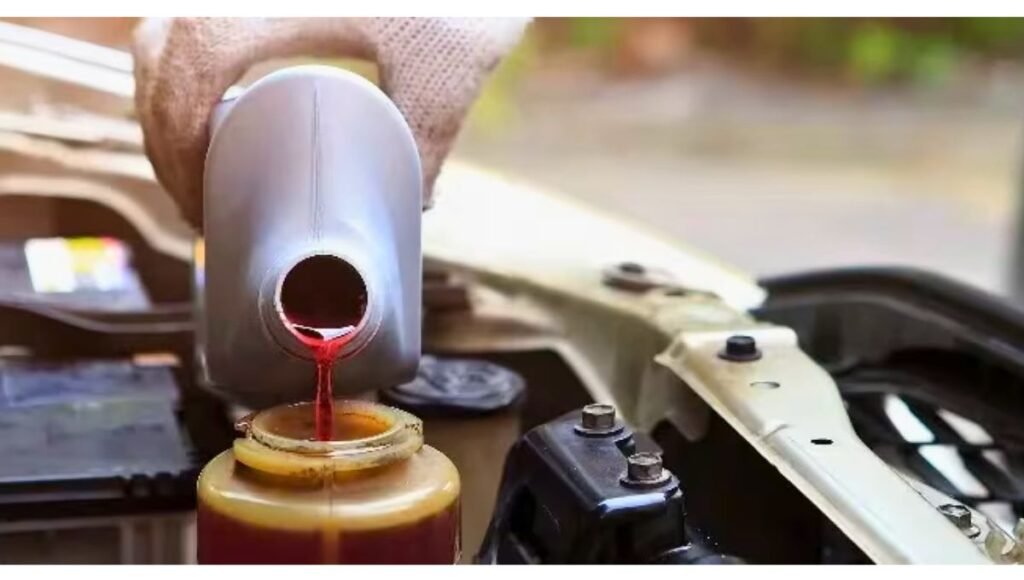
Suitable Substitutes
There are several suitable substitutes for brake fluid in hydraulic jacks. These alternatives ensure your jack works smoothly and lasts longer.
- Hydraulic Oil: Designed specifically for hydraulic systems. It provides excellent lubrication and reduces wear.
- Automatic Transmission Fluid (ATF): Known for its high performance. It is a good option for hydraulic jacks.
- Power Steering Fluid: A viable substitute, offering good lubrication properties.
Diy Hydraulic Fluid Options
If you prefer a DIY approach, there are some options you can consider. These can be cost-effective and readily available.
- Vegetable Oil: A natural and biodegradable option. It can be used temporarily in emergency situations.
- Baby Oil: It is light and easy to find. Suitable for short-term use.
- Mineral Oil: Widely available and affordable. It can serve as a quick fix.
Choosing the right fluid ensures your hydraulic jack operates efficiently. Whether using commercial or DIY options, ensure they meet the jack’s requirements.
Best Practices For Hydraulic Jack Maintenance
Maintaining your hydraulic jack ensures it works well and lasts long. Proper care and timely checks are crucial. This guide covers essential maintenance tips.
Regular Fluid Checks And Changes
Regularly check the fluid level in your hydraulic jack. Low fluid can cause the jack to fail. Use the right type of hydraulic fluid, not brake fluid. Brake fluid can damage the seals and make the jack unsafe.
- Inspect the fluid level before each use.
- If the fluid is low, top it off with the correct hydraulic oil.
- Change the fluid every 6 months to keep the jack in good condition.
- Always use a clean, lint-free cloth to wipe the area around the fill plug.
Long-term Storage Tips
Store your hydraulic jack properly to prevent damage. Follow these steps for long-term storage:
- Lower the jack to its minimum height.
- Clean the jack to remove dirt and debris.
- Store the jack in a dry, cool place to avoid rust.
- Cover the jack to protect it from dust.
Proper maintenance of your hydraulic jack ensures safety and longevity. Follow these best practices for optimal performance.
Consequences Of Improper Fluid Use
Using the wrong fluid in a hydraulic jack can cause severe issues. Brake fluid is not suitable for hydraulic jacks. This mistake can lead to costly repairs and safety hazards.
Warranty And Insurance Implications
Using brake fluid can void your jack’s warranty. Manufacturers specify the correct fluid for a reason. Warranty claims may be denied if the wrong fluid is used. Insurance policies may also be affected. They might not cover damages caused by improper fluid use. Always follow the manufacturer’s guidelines.
Resale Value Impact
Improper fluid use can lower your jack’s resale value. Potential buyers want well-maintained equipment. Using the wrong fluid can lead to internal damage. This damage can be hard to fix and expensive. Buyers will notice if the jack is not working properly. They may offer less money or choose not to buy.
Can Brake Fluid Be Used In A Hydraulic Jack?
No, brake fluid should not be used in a hydraulic jack. Brake fluid and hydraulic oil have different properties and chemical compositions. Using brake fluid can damage seals and reduce performance. Always use the recommended hydraulic oil.
What Is The Proper Fluid For Hydraulic Jacks?
The proper fluid for hydraulic jacks is hydraulic oil. Hydraulic oil is specifically designed for hydraulic systems. It maintains the performance and longevity of the jack. Always refer to the manufacturer’s recommendations.
What Happens If Wrong Fluid Is Used In A Hydraulic Jack?
Using the wrong fluid can damage seals and internal components. It can lead to leaks and reduced efficiency. Always use the recommended hydraulic oil to ensure optimal performance.
Can Hydraulic Oil And Brake Fluid Be Mixed?
No, hydraulic oil and brake fluid should not be mixed. They have different chemical compositions and properties. Mixing them can cause damage to hydraulic systems. Always use the correct fluid as specified by the manufacturer.
Conclusion
Using brake fluid in a hydraulic jack is not recommended. It can cause damage and affect performance. Always use the manufacturer-recommended hydraulic fluid. This ensures optimal functionality and longevity. Proper maintenance and correct fluid use are crucial for safety. Follow these guidelines for a reliable and efficient hydraulic jack.
